Don't Flush Cat Poop Down Your Toilet - Preserve Your Home's Pipe System
Don't Flush Cat Poop Down Your Toilet - Preserve Your Home's Pipe System
Blog Article
This great article listed below relating to How to Dispose of Cat Poop and Litter Without Plastic Bags is pretty much entertaining. Read on and draw your own conclusions.

Intro
As cat proprietors, it's vital to be mindful of how we dispose of our feline close friends' waste. While it might seem convenient to flush pet cat poop down the bathroom, this technique can have destructive repercussions for both the setting and human wellness.
Alternatives to Flushing
The good news is, there are more secure and much more responsible means to deal with cat poop. Take into consideration the adhering to alternatives:
1. Scoop and Dispose in Trash
The most typical technique of dealing with feline poop is to scoop it right into an eco-friendly bag and throw it in the trash. Make certain to make use of a devoted litter scoop and dispose of the waste without delay.
2. Use Biodegradable Litter
Choose eco-friendly feline clutter made from materials such as corn or wheat. These clutters are environmentally friendly and can be safely gotten rid of in the trash.
3. Hide in the Yard
If you have a yard, consider hiding cat waste in a designated area far from veggie gardens and water resources. Make sure to dig deep sufficient to prevent contamination of groundwater.
4. Mount a Pet Waste Disposal System
Invest in a pet waste disposal system specifically made for pet cat waste. These systems utilize enzymes to break down the waste, minimizing odor and ecological impact.
Health and wellness Risks
In addition to ecological problems, purging feline waste can also posture wellness risks to human beings. Feline feces might contain Toxoplasma gondii, a bloodsucker that can cause toxoplasmosis-- a possibly serious ailment, especially for expecting ladies and people with weakened immune systems.
Ecological Impact
Flushing cat poop introduces unsafe pathogens and parasites right into the water system, posturing a considerable danger to marine ecosystems. These contaminants can adversely affect marine life and concession water quality.
Verdict
Accountable animal ownership prolongs past giving food and sanctuary-- it likewise entails appropriate waste administration. By refraining from purging feline poop down the bathroom and choosing different disposal techniques, we can lessen our ecological footprint and secure human wellness.
Why You Should Never Flush Cat Poop Down the Toilet
A rose by any other name might smell as sweet, but not all poop is created equal. Toilets, and our sewage systems, are designed for human excrement, not animal waste. It might seem like it couldn’t hurt to toss cat feces into the loo, but it’s not a good idea to flush cat poop in the toilet.
First and foremost, assuming your cat uses a litter box, any waste is going to have litter on it. And even the smallest amount of litter can wreak havoc on plumbing.
Over time, small amounts build up, filling up your septic system. Most litter sold today is clumping; it is made from a type of clay that hardens when it gets wet. Ever tried to scrape old clumps from the bottom of a litter box? You know just how cement-hard it can get!
Now imagine just a small clump of that stuck in your pipes. A simple de-clogger like Drano isn’t going to cut it. And that means it’s going to cost you big time to fix it.
Parasitic Contamination
Believe it or not, your healthy kitty may be harboring a nasty parasite. Only cats excrete Toxoplasma in their feces. Yet it rarely causes serious health issues in the cats that are infected. Most people will be fine too if infected. Only pregnant women and people with compromised immune systems are at risk. (If you’ve ever heard how women who are expecting are excused from litter cleaning duty, Toxoplasma is why.)
But other animals may have a problem if infected with the parasite. And human water treatment systems aren’t designed to handle it. As a result, the systems don’t remove the parasite before discharging wastewater into local waterways. Fish, shellfish, and other marine life — otters in particular — are susceptible to toxoplasma. If exposed, most will end up with brain damage and many will die.
Depending on the species of fish, they may end up on someone’s fish hook and, ultimately on someone’s dinner plate. If that someone has a chronic illness, they’re at risk.
Skip the Toilet Training
We know there are folks out there who like to toilet train their cats. And we give them props, it takes a lot of work. But thanks to the toxoplasma, it’s not a good idea.

As an avid reader about Don’t flush cat feces down the toilet, I was thinking sharing that piece of content was necessary. Do you know about someone else who is inquisitive about the subject? Feel free to share it. Thanks so much for your time spent reading it.
Details Report this page